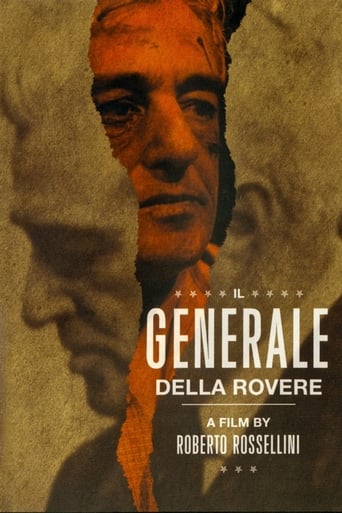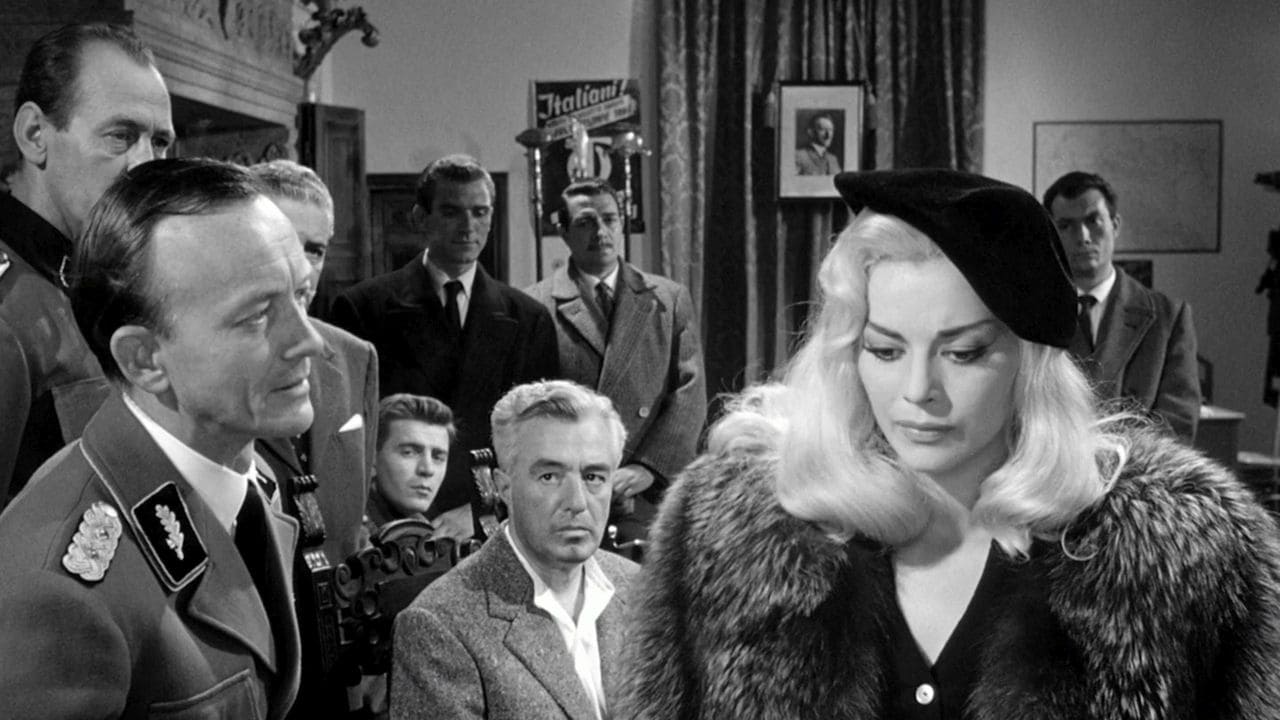tieman64
Roberto Rossellini directs fellow neorealist Vittorio De Sica in "General della Rovere".De Sica – we forget how much of a suave, handsome actor the director was - plays Emanuele Bardone, a lowly con man struggling to make ends meet in 1940s, war-torn Genoa. His modus operandi? Promise his fellow Italians that he can find their missing loved ones in exchange for money. He prostitutes World War 2, and profits on the suffering of his countrymen.It's not long, though, before Bardone is reprimanded by the German Army and forced to impersonate a dead partisan general. His mission? Enter a prison and extract information from fellow inmates regarding the identity and location of an Italian Resistance fighter. Bardone does as told – he's a schemer who does whatever it takes to survive – but eventually undergoes a crisis of conscience. He then betrays the Germans and accepts his fate.The majority of Rossellini's more well known films are sentimental, and "General della Rovere", which won the Golden Lion at the Venice Film Festival, is no different. Though he holds his cast at an distance, content to let their actions do the talking, Rossellini's unusually austere aesthetic (classical camera work, gorgeous, inky blacks and whites) is nevertheless perfectly in line with most neorealist works, which, far from being a "gritty" movement, always sanctified the downtrodden and venerated the lowly. "General della Rovere" does the same, exalting Bardone as a fallen angel who eventually finds redemption.Most interesting about the film is the Nazi Colonel who recruits Bardone. He's played with nuance by Hannes Messemer, a real life German Colonel. In contrast, De Sica's character takes on the attributes of your typical movie Nazi; suave, debonair, amoral and coolly calculating.8/10 - "General della Rovere" was a critical and box office success upon release, but it's lesser Rosselini, formulaic and easy. Worth one viewing.
oOgiandujaOo_and_Eddy_Merckx
The story of the film concerns "Colonelo" Bertone a self-appointed community intercessor and thief in World War II Italy, passing on bribes from families to the Germans in order to help their sons (or gambling away the bribes and eating their food parcels). It's definitely a film of two halves, the first half of the movie to me feeling decidedly Pasolinian. Bertone, though undoubtedly a scoundrel does his best to keep people happy, is a character that spreads a certain amount of charm in the world. For some people who have never known love or had anyone to look up to, he provides a show, his charisma is like ambrosia. Having been brought up with Protestant vales it has been a revelation to me in life how people value charm as most precious, a Veblen good, more prized when it is most demanding, how a charming person is valued above all others even when they live in a moral vacuum.The second half of the movie is, in structure, a more conventional prison movie where Bertone, working for the Germans in order to save his skin, becomes an impostor pretending to be Generale della Rovere. Whilst pretending to be the general he begins to assume many of the general's characteristics. This part of the film is very patriotic, and contains a beautiful fresco of Italian cities on the prison wall. The ideology of this part of the movie is all about recognising the efforts of the largely Communist, Partito d'Azione and Socialist partisan resistance, bodies who were largely excluded from the post-fascist Italian government, which was dominated by the Christian Democrats, who many felt to have been tainted by association with fascism.Pontecorvo's movie Kapò was released contemporaneously, and features a similarly caricatured version of the Teutonic gaoler and slightly ebullient view of World War II, that would become refined in future decades. That said, Il Generale della Rovere, is undoubtedly a masterpiece.
Cosmoeticadotcom
Il Generale Della Rovere was one of Roberto Rossellini's most successful films (winning the Golden Lion at the Venice Film Festival), commercially, and there is a simple reason why. It's not that good a film. It's a rather formulaic film, slathered with faux patriotic sloganeering, whitewashed politics, and a rather banal cinematic approach. Rossellini was, along with the film's star, Vittorio De Sica, one of the two big name directors of what was known as Italian Neo-Realism. But, while 1945's Rome: Open City was also a financial success for Rossellini, he went almost fifteen years between that success and this one, in 1959. De Sica, however, had more commercial and critical success in the interim.The film's plot is supposedly based on real life events that took place in World War Two, after Italy switched sides, leaving the Axis and joining the Allies. However, there has been dispute, among historians, over whether the tale is true or not, and just how much of the tale, if true, is apocryphal, or the result of hagiography, because it was based on a novel by Indro Montanelli. The tale follows the life of a petty conman named Victorio Emanuele Bardone (De Sica), who uses a bunch of assorted aliases (including that of a phony Italian colonel named Grimaldi) to run his assorted scams and schemes, fleecing attractive women (wannabe actresses and prostitutes) and desperate families who are willing to pay him for information on the whereabouts of relatives who have been arrested by the Nazis. The black and white film runs for 2 hours and 13 minutes, and the first 45 or so minutes follows the escapades of Bardone, and watching him gamble and lose, fleece his suckers, and generally act in unethical ways, is the best part of the film. Especially good is watching him interact with a Nazi colonel named Muller (Hannes Messemer), for both men are essentially the same person, phonies who are out to wreak havoc in the world. The one difference is that Muller actually has fangs, and is willing to use them, whereas Bardone lacks the fangs and the will.This is one of those films that I can marginally recommend viewing, if only because it illuminates the better work being done at the same time, like Fellini's La Dolce Vita. On its own, however, Il Generale Della Rovere is vastly overrated and a disappointing film in not only Rossellini's canon, but that of Italian cinema, despite its financial success. Hollywood was not alone in this regard. Why it was so critically well regarded, however, is a mystery, since its flaws are apparent. Then, again, never underestimate the power of patriotic screeds, especially when the legend looms larger than the man. Damn, I didn't know Rossellini loved John Ford.
rossangela
I fully agree with all the glowing accolades of other commenters and totally disagree with the one commenter who thought it was "uneven." This is one of the greatest films ever made, partly because the humanity of the characters and the choices they must make are really what life is all about. If only present-day film makers (producers, directors, writers, etc) would concentrate their efforts towards making films of this caliber, what a much better world this would be. Instead, desiring profits over quality, they go for the lowest common denominator, and continue to make films bereft of the poetry of life, and full of gore, violence, guns, explosions, terror, and all sorts of ugliness and gratuitous noise. They think "this is what the public wants." How wrong they are. One interesting aside: I believe that Rosselini wasn't really as satisfied with this film as much as audiences are. If that rumor is true, it can only be an example of an artist not realizing the impact and importance of a particular work they have created.


 AD
AD



